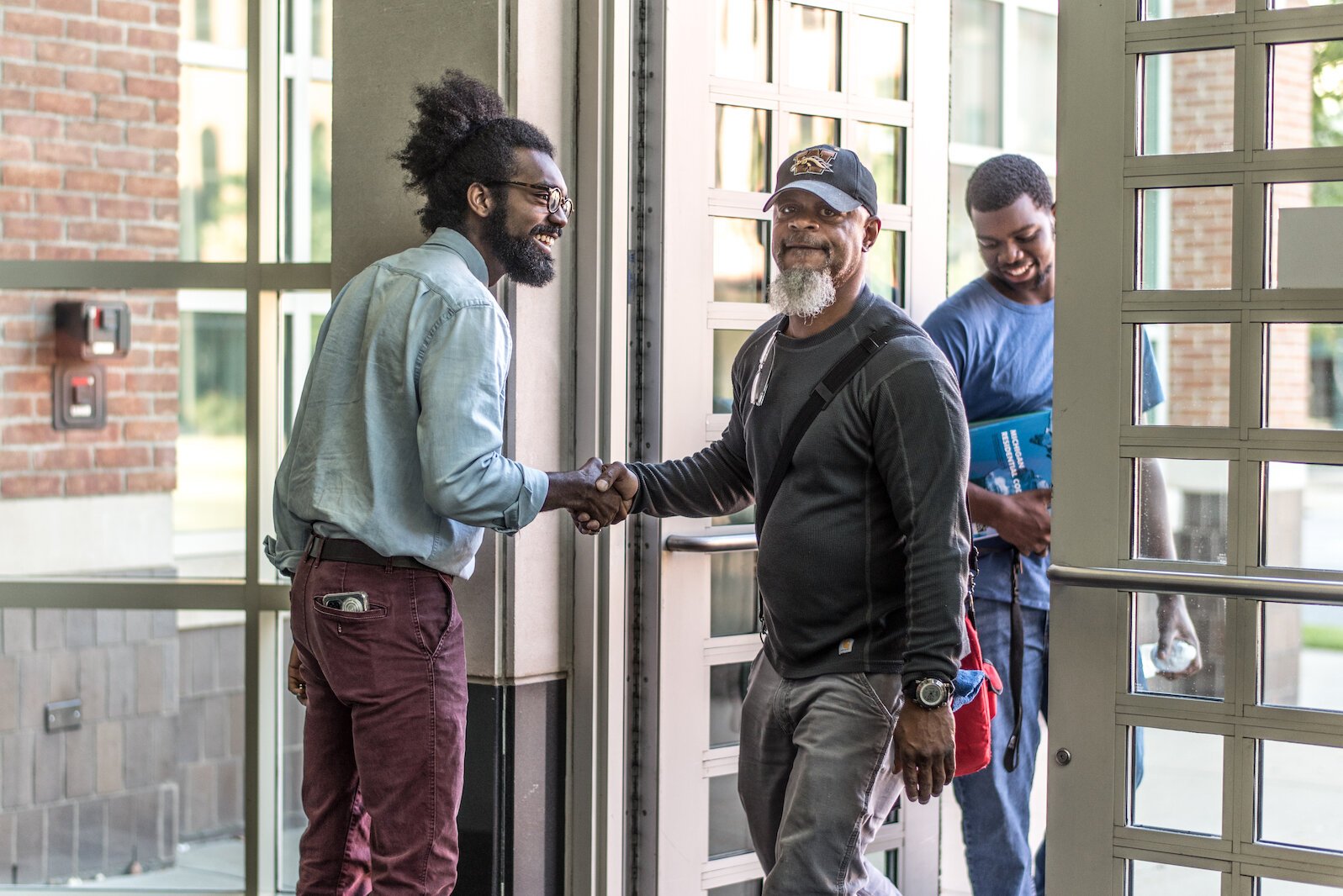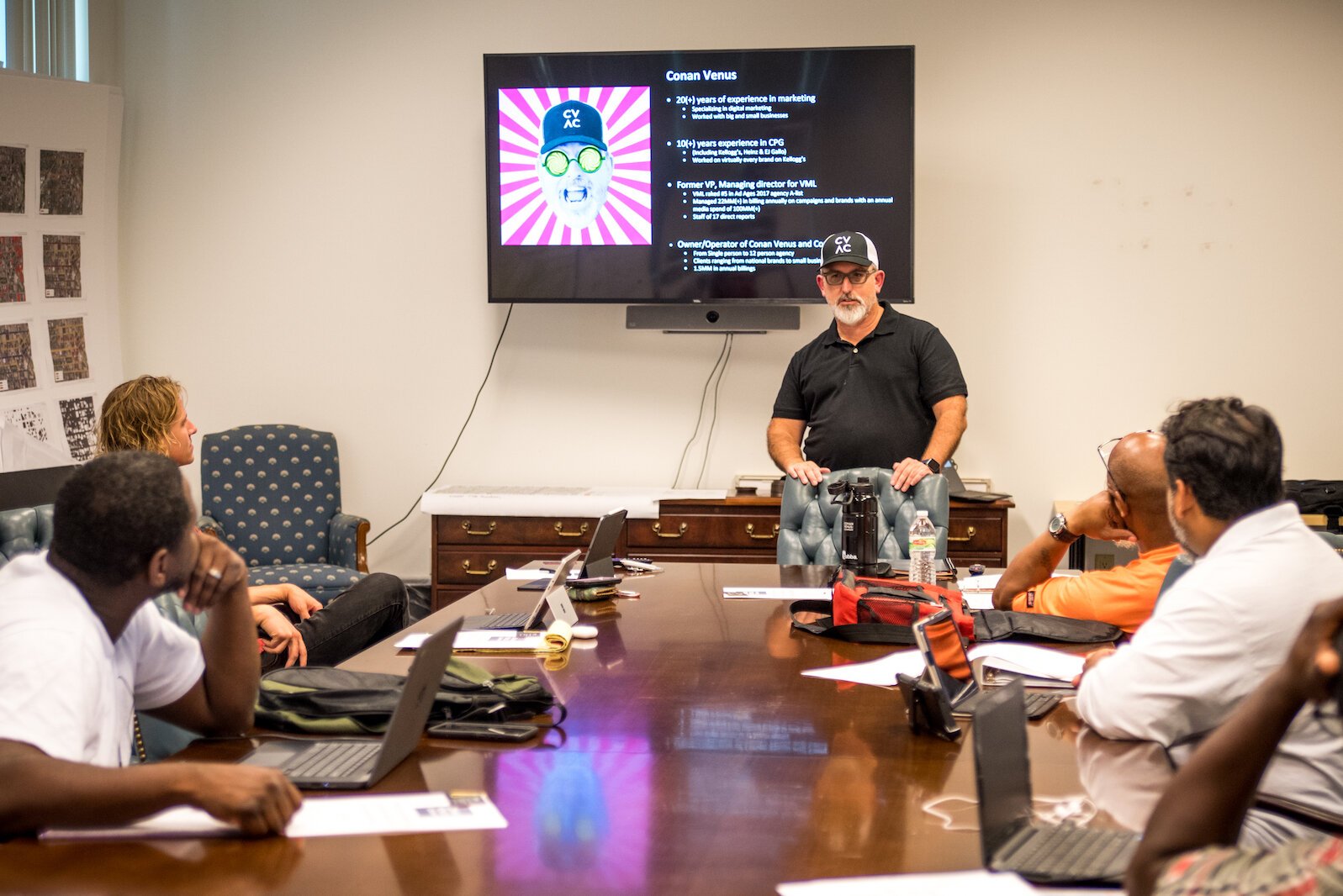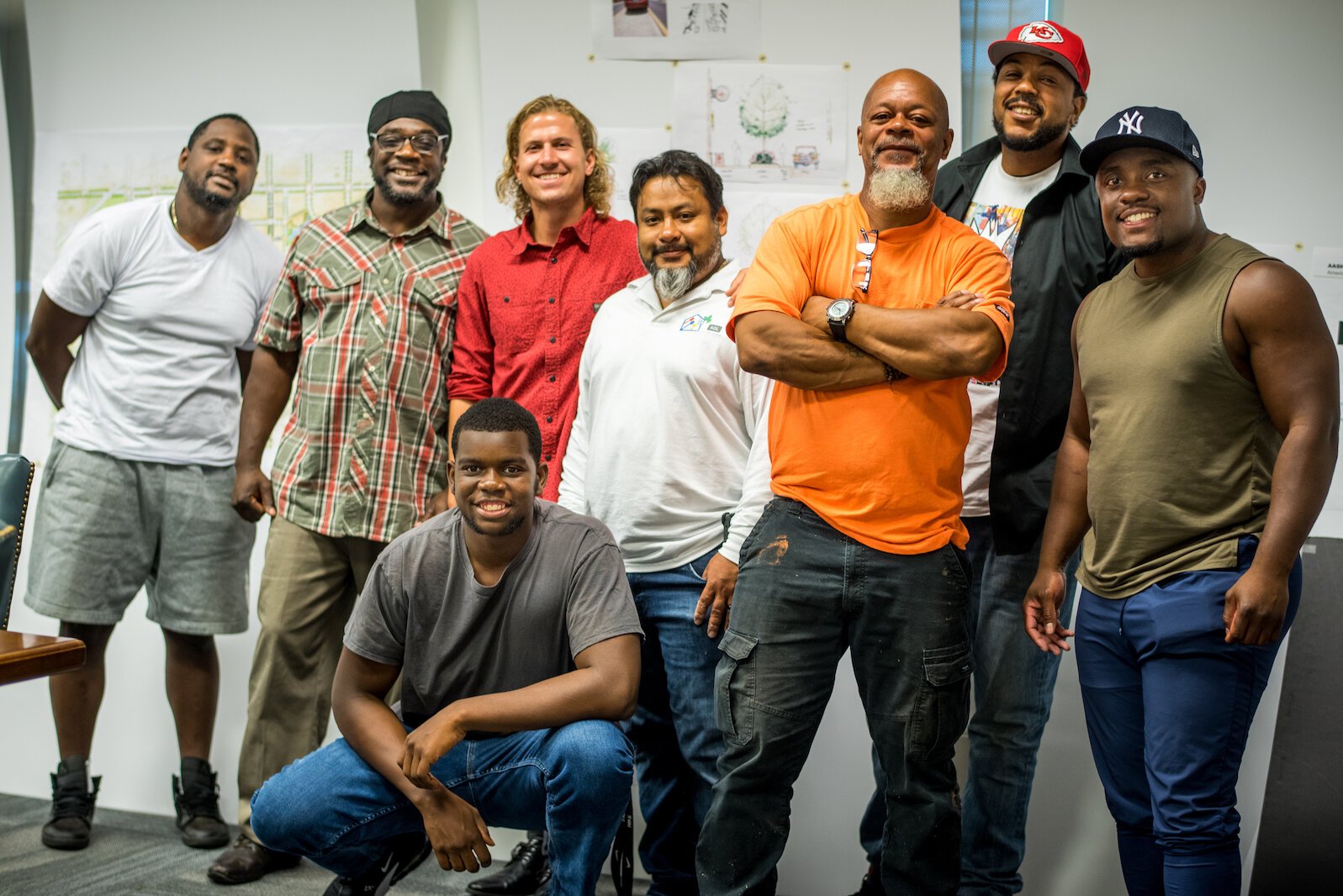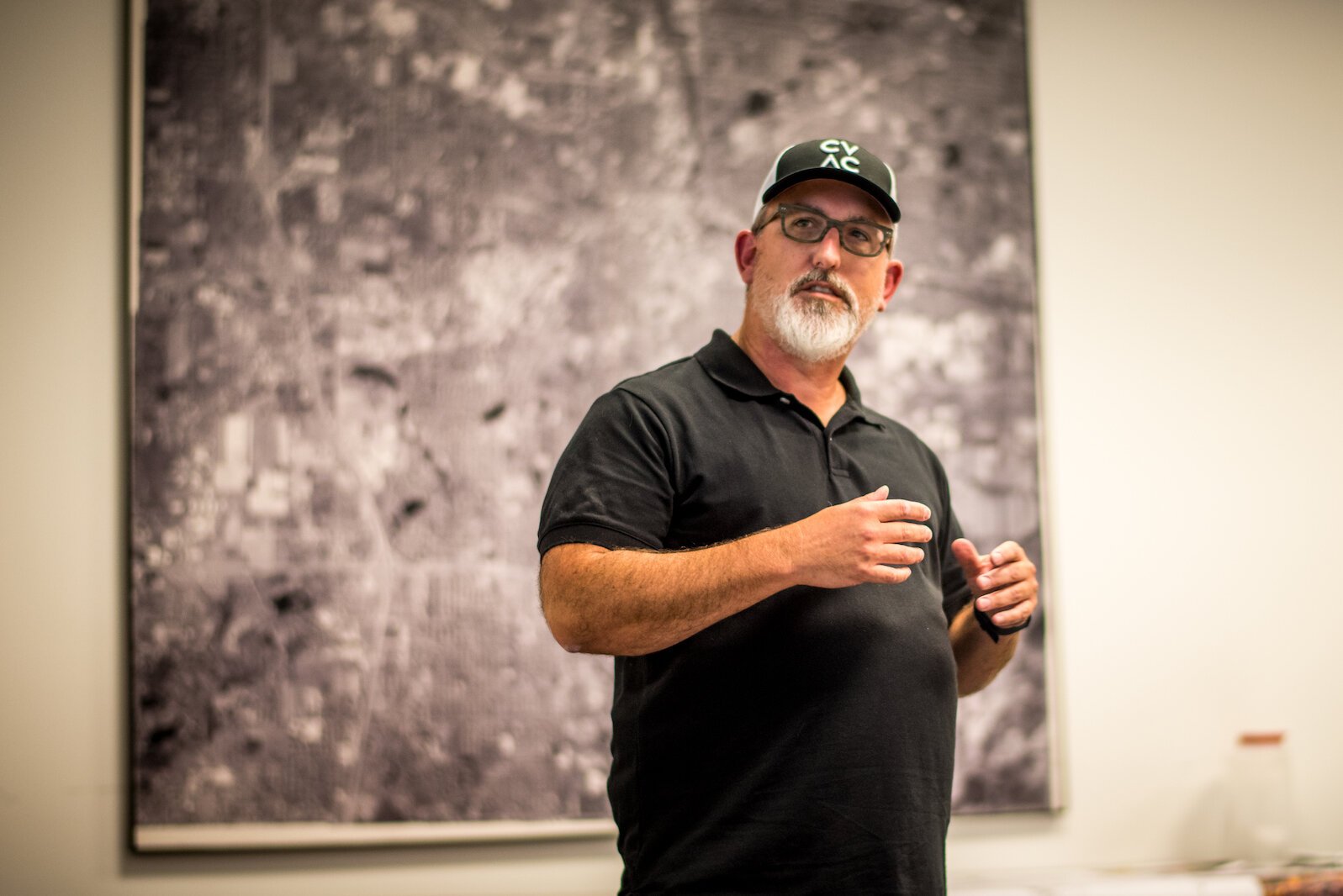This story is part of Southwest Michigan Second Wave’s series on solutions to affordable housing and housing the unhoused. It is made possible by a coalition of funders including the City of Kalamazoo, Kalamazoo County, the ENNA Foundation, and LISC.
These men are willing to do the hard work – roofing, dry-walling, plumbing, framing, mechanical. In fact, they want a lot more of it.
So the eight minority contractors hunkered around a conference table in an unremarkable building in downtown Kalamazoo on a recent Thursday evening, are studying.
The men (there are only men in the group thus far) are at the end of a regular working day, which means each has already put in a full day’s work as a roofer, or plumber, or handyman, in order to put food on their tables, and to pay their bills. But they want to get ahead. So they are studying for their Michigan Builders License examination.
“It’s a 60-hour building license,” says business consultant Donovan McVey, referring to the amount of training required for the test. “It (having a license) allows them to take on larger projects, to be protected legally, and to have other contractors work for them.”
That’s important because there are lots of individuals in the construction trades who say they have been frustrated by not knowing how to bid on new projects and how to make their efforts do more than cover their costs.

“You could be a builder,” McVey says. “You could be a handyman for 20-plus years and not have a builders license. But you’ll never be protected legally and you’ll never be able to really scale your business beyond a certain point.”
That’s significant because authorities say the Kalamazoo area and the nation as a whole need more builders and people in the construction trades. There is a shortage as seasoned workers age out of the field and as fewer young people – who often hear about the benefits of college but infrequently hear about career opportunities in the construction trades – are not engaged by the industry.
“We’re constantly hearing that there are not enough workers,” says Joshua Gray, a partner in the Kalamazoo-based Room 35 consulting firm along with McVey. “There’s not enough contract workers, skilled tradesmen. … So there’s an opportunity for people to get in a little bit easier than before. Maybe they won’t need as many credentials to get in and prove themselves.”
Gray says that provides opportunities for minorities to work for themselves, own their own companies, and build wealth. He says a young person can often make more money going right into trade school or into an apprenticeship than going to college.
“You want to make $50,000 out of high school, without going to college?” Gray asks. “You can make more money doing roofing. It sucks sometimes. But you make $25 to $30 an hour doing roofing, framing, drywalling. Things that cannot be automated.”
The eight contractors reviewing information to pass the licensing exam are participating in a pilot program called Core 60. It teaches “core” business competencies with one-on-one counseling as well as in group sessions.

“We have people in the group who are on the development side (of the construction industry) who are looking to partner with the City of Kalamazoo and LISC (Local Initiatives Support Corp.) and get millions of dollars of funding and get new build-outs (building contracts),” says McVey. “Working down from there, we have a couple of contractors who have 1099 teams (independent contractors they hire) that they trust, or a couple of employees. And then a couple of them are just solo shops (one-person operations) and that’s where they want to stay. But they want to get licensed so they can evolve their businesses, be more validated.”
Room 35, is primarily a two-man operation that includes McVey and former Western Michigan University classmate Joshua Gray. They are energetic specialists in business start-ups who work with nearly 30 other individuals and companies and consider Room 35 to be “an economic development firm that works through the lens of entrepreneurship consulting.”
The firm has been hired by the City of Kalamazoo, Southwest Michigan First, Housing Resources Inc., and other organizations to develop and run entrepreneurial business-growth programs. Thus far those have included the Core 60 program, whose first cohort is the group of men expected to test soon for contractors’ licenses, and a program called The Blueprint, which is intended to accelerate the development of builders who are already licensed. Those are companies that have been in the industry for 10 or more years and have at least $100,000 in annual revenues. The Blueprint has been working with three minority contractors since December and is set to end this month.
Gray and McVey are developing a program focused on bookkeeping and finance that they hope to launch this fall. The second cohort of Core 60 and The Blueprint are expected to be offered later this year. Third rounds are expected in 2023.
The programs are run in partnership with the City of Kalamazoo and the Kalamazoo Foundation For Excellence, which provides about $30,000 to The Blueprint program and about $46,600 to Core 60. They are facilitated by Melody Daacon, Neighborhood Business and Special Projects Coordinator for the city.
“I want to ultimately get my contractor license,” says Cory Yarbrough, 47, of Kalamazoo. He has a full-time job with an automotive supplier in the area and does part-time work upgrading and remodeling rental housing. For about the last five years, he has owned and operated Mae & June Landscaping during his off-hours and he loves the work. But he primarily uses a crew of about four people to do most of the residential landscaping, power washing, gutter cleaning, and other services that the business offers.

Yarbrough has considered himself an entrepreneur since he began cutting grass as an adolescent to make money to buy school clothes. But at age 47 he wants to evolve into more construction projects by making sure he has the credentials he needs to eventually land bigger contracts.
“I know from doing that, that (licensure) will open up a little more opportunities for someone like myself – to bid on some of these contracts in the Kalamazoo area that we, as minorities, are not even able to touch,” he says.
During the last two years, Yarbrough says he has been able to network with other builders during regular gatherings of minority contractors and his landscaping business has grown. Those gatherings that were started about five years ago by Dwayne Powell Jr., who was a Neighborhood Business & Special Project Coordinator for the City of Kalamazoo. McVey and Gray say Powell’s efforts, which included developing partnerships with organizations like the Southwest Michigan Home Builders Association, paved the way for programs like Core 60, which is subsidized by the City of Kalamazoo.
Speaking of monthly gatherings, which he and McVey started attending before they were contracted by the city, Gray says he has seen a list of about 100 minority contractors in the Kalamazoo area.
“Things that they (contractors) kept on saying were that they didn’t have enough jobs and they weren’t getting commercial contracts,” Gray says. “There were no processes in place. There was no process for invoicing. They didn’t have software to quote out projects. There wasn’t enough training. They didn’t know how to do bidding.”

He says they were disappointed that more wasn’t being done to help them. But he and McVey plan to improve on what’s available to them.
“There are a lot of people that are just doing the handyman thing,” McVey says. “But we want to take that group to the next level because (sticking with that) you’re not building generational wealth. You’re not building any wealth. You’re just making it to next week.”
He says he wants to know, “How can we get you to next year? How can we get you three years out?”
Yarbrough sees potential for growth as he and others evolve from the gatherings organized by Powell to the 12-week Core 60 program. Along with landscaping, he says he has repaired cars, helped build houses, and done mechanical work. He has been interested in the construction trades since participating in home economics and shop classes in school. He was hooked after he learned how to take pieces of wood and make a table, he says.
Participants in Core 60 have learned how to properly bid on projects, how to properly capitalize a business, how to grow their businesses, and how to partner with members of the group through social networking, McVey says.

“The next step is we’re getting them all registered for the exam and then, within the next month or so, everybody will have taken the exam,” McVey says. “And then we’ll reconvene and get numbers back from that, as far as who passed and who didn’t, and then how we move forward from there.”
He says everything is about long-term thinking. “And I think that’s a huge mindset shift for a lot of these guys,” he says “They’re thinking 10 weeks down the road. I’m thinking 10 years. I want to look at this course and not only see success and network capacity and all that driven through these 12 weeks. But I want to look at your business – and I will look at your business in five years or 10 years – and if I don’t see some tangible results, like this being a catalyst for your long-term success, then we haven’t done our job.”
Of Core 60, Gray says, “One success in my mind is them having work, (having) connections, and they aren’t worried about what they’re going to do for the next few months.” Success in The Blueprint program, McVey says, is having participants grow their businesses by 20 to 30 percent over the course of a year. A roofing company that has been a protégé has actually seen 100 percent growth rate since the program got going last December.
“A lot of it was kind of simple things,” Gray says, “like who are you focusing on when you’re selling? What’s your selling process? What are you charging? Why are you charging that? Going through questions they probably never asked themselves.”
To accelerate the growth of established businesses, Room 35 is working with PNC Bank and others to create mentoring and networking opportunities with large companies. It is also consulting with new businesses through Can-Do Kalamazoo, an incubator for start-up companies.
Helping to diversify the building industry is another hope, the men say. McVey and Gray are looking to develop partnerships with community and neighborhood organizations to scout for individuals who may benefit from the programming. But they hope the success found by those who complete their programs will attract more minorities into the construction trades.
Yarbrough says he thinks about jobs he could have had building any of the marijuana dispensaries that have popped up all over town during the past few years – from the demolition of structures that were in the way, to the construction or renovation of new structures there.

“When I ride past and see people building stuff, I never see anybody who looks like me,” Yarbrough says of those projects. On big projects, minorities have found work as laborers. “But I don’t want to just be a laborer,” he says.
“I get tired of (hearing about) contracts, and people doing them,” says Yarbrough, who is African-American. “But people of color? I never see none of my people down there. So they’re like, ‘It’s because y’all don’t have contractors licenses.’ So I’m like, ‘What do we have to do to do that because I know how to build.’”






















